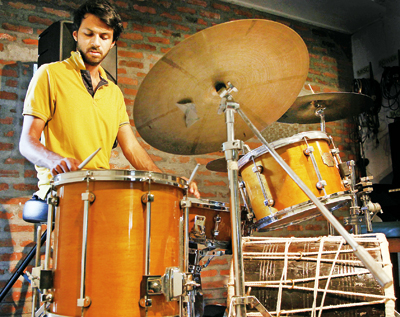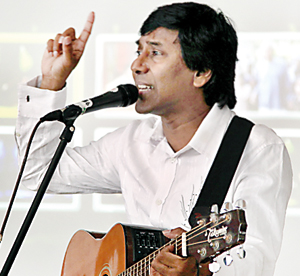Drumming his own kind of beat
This is the question: How can he reconcile his love for jazz with a deep appreciation of Sri Lankan ritual music? For Dr. Sumudi Suraweera the answer was to literally fuse the two by building his own ‘hybrid’ drum kit. Paired with the sweet, clear notes of the piano and the heavy thrum of the double bass, his instrument adds an unusual element to the music of the trio Compound Eye, which is made up of Sumudi, Eshantha Joseph Peiris and Isaac Smith. You can hear the deep, echoing sound of the Sabaragamuwa drum known as the dawula on original compositions like ‘Vahala’, ‘Kohomba Halla’ and ‘Ode to Man as a Plural Being’; but where a traditional musician would call forth the sound with a kadippu or stick, Sumudi simply presses down on his bass drum pedal.

Pix by M.A. Pushpa Kumara
“My family moved to New Zealand when I was 12 and that was when I started playing the drums,” he says, confessing that he wasn’t particularly attached to the instrument. “I wasn’t one of those kids who was always banging on pots and pans – it was just that the music teacher at my school saw some sort of potential in me. That’s how it started.” Sumudi would go on to pursue a Bachelor of Music in jazz, majoring in drums and earn his degree with first-class honours. In the meantime, a burgeoning interest in traditional Sri Lankan drumming brought him back to the island where he met and studied under masters of ritual music. In 2010, his interest culminated in a Ph.D in Ethnomusicology from the University of Canterbury, New Zealand. His thesis was on traditional low-country drumming in Sri Lanka.
Today, when Sumudi plays, his drum isn’t content to limit itself to setting the pace in the background – instead it has a loud, unruly voice of its own. This joie de vivre is something that both ritual and jazz drumming have in common. The styles include elements of improvisation that encourage a musician to experiment. When it comes to jazz in particular, Sumudi says: “It’s just that freedom to be expressive. If you take other popular forms, not to put anything else down, you may be repeating a small pattern or keeping a consistent beat, but in jazz drumming you can keep evolving an idea. It can be just like someone having a conversation.”
A key part of that conversation for each musician lies in developing a distinctive vocabulary of his or her own, something Sumudi himself aspires to. “All the greats have become great because they have had their own language, their own identity. This is just my way of searching for that thing.” His hybrid drum set is in the process of evolving too. With the stand removed, the smaller dawula has taken the place of the bass drum and Sumudi has ideas for more custom-made Sri Lankan drums he could incorporate into his set.
In the meantime, he has made a career out of teaching his art at the school, Music Matters, which he and Eshantha founded over two years ago. Some of their advanced students are beginning to express an interest in learning jazz and Sumudi seems pleased. In more ways than one, his career in music remains a work in progress – but for someone who sees it all as an adventure, that isn’t a bad thing.
Follow @timesonlinelk
comments powered by Disqus



















